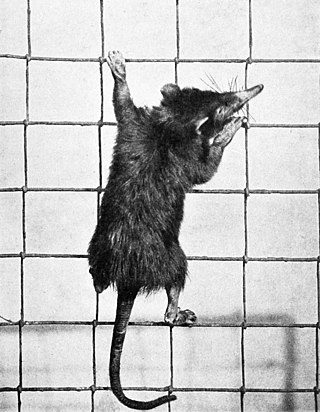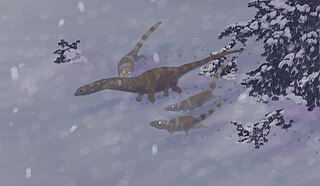Paradoxus is a genus of moths of the family Yponomeutidae.
Contents
Paradoxus may also refer to:
Paradoxus is a genus of moths of the family Yponomeutidae.
Paradoxus may also refer to:
It is used for species with unexpected features.
Melia or Melie may refer to:

The Cuban solenodon or almiquí is a small, furry, shrew-like mammal endemic to mountainous forests on Cuba. It is the only species in the genus Atopogale. An elusive animal, it lives in burrows and is only active at night when it uses its unusual toxic saliva to feed on insects. The solenodons, native to the Caribbean, are one of only a few mammals that are venomous.

Solenodons are venomous, nocturnal, burrowing, insectivorous mammals belonging to the family Solenodontidae. The two living solenodon species are the Cuban solenodon and the Hispaniolan solenodon. Threats to both species include habitat destruction and predation by non-native cats, dogs, and mongooses, introduced by humans to the solenodons' home islands to control snakes and rodents.
Dilong is a Chinese dragon name that is also used to mean "earthworm".

The Hispaniolan solenodon, also known as the agouta, is a small, furry, shrew-like mammal endemic to the Caribbean island of Hispaniola. Like other solenodons, it is a venomous, insect-eating animal that lives in burrows and is active at night. It is an elusive animal and was only first described in 1833; its numbers are stable in protected forests but it remains the focus of conservation efforts.
Marcano's solenodon is an extinct species of mammal in the family Solenodontidae known only from skeletal remains found on the island of Hispaniola.

Dongbeititan is a genus of sauropod dinosaur from the Early Cretaceous-age Yixian Formation of Beipiao, Liaoning, China. It is based on holotype DNHM D2867, a partial postcranial skeleton including bones from the limbs, shoulder and pelvic girdles, and vertebrae, which was described in 2007. Its describers suggested it was as a basal titanosauriform, not as derived as Gobititan or Jiutaisaurus, but more derived than Euhelopus, Fusuisaurus, and Huanghetitan. The type species is D. dongi, and it is the first named sauropod from the Yixian Formation, which is part of the well-known Jehol Group. The genus name refers to the region Dongbei and to Greek titan, "giant". The specific name honours the Chinese paleontologist Dong Zhiming. Like other sauropods, Dongbeititan would have been a large quadrupedal herbivore.
C. gracilis may refer to:
Darwini, a New Latin adjective that commonly refers to Charles Darwin, may refer to:
Girardi may refer to:
C. grandis may refer to:
C. japonica may refer to:
T. orientalis may refer to:
G. orientalis may refer to:
M. amurensis may refer to:
Lucidus may refer to:
A. spectabilis may refer to:
T. occidentalis may refer to several different species. The specific epithet occidentalis means 'western.'

Solenodon is a genus of small, shrew-like mammals native to the Caribbean. It is one of two genera in the solenodon family, Solenodontidae. The genus Solenodon includes three species, only one of which is still living—the Hispaniolan solenodon. This classification follows the American Society of Mammalogists.